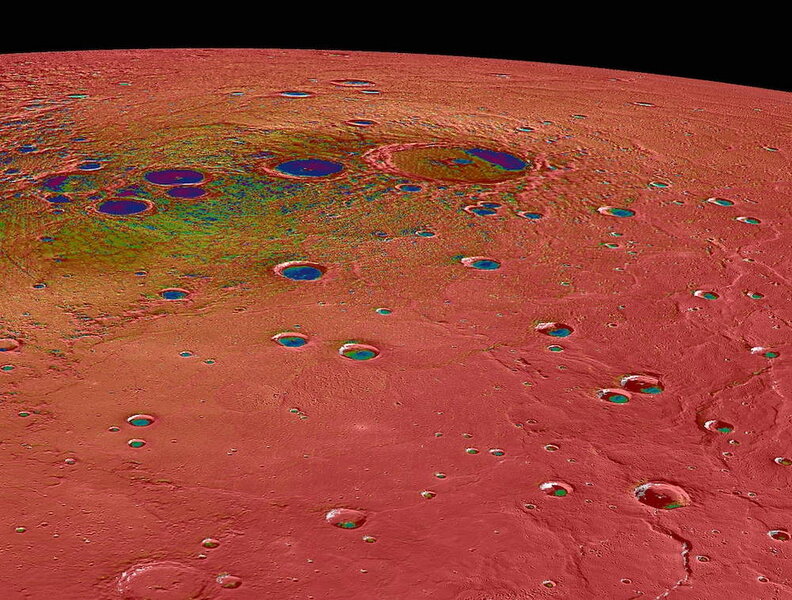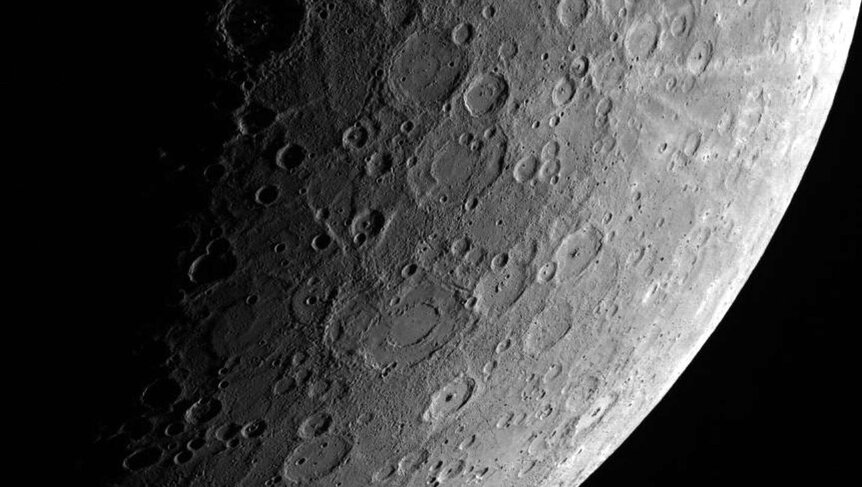Create a free profile to get unlimited access to exclusive videos, sweepstakes, and more!
Could There Be Life Hiding in Salt Glaciers on Mercury?
Hot, salty glaciers might be home sweet home for aliens.
Popular culture offers a very specific view of alien life, one which looks an awful lot like humanity and is often capable of experiencing the world and communicating in recognizable ways. Take Resident Alien (streaming now on Peacock) for example. Everyone’s favorite alien, Harry Vanderspeigle (Alan Tudyk), looks pretty familiar even in his alien form. He uses technology of a similar type and he can blend in (through the use of extraterrestrial shapeshifting) seamlessly with our society.
It’s difficult to speculate about where and how alien life might actually exist, not having yet found any. However, if alien life does exist it’s likely to crop up in all kinds of environments, some of which might be wholly incompatible with our own. Recently, scientists from the Planetary Science Institute uncovered evidence of salt glaciers on Mercury which could provide chemically rich environments for extraterrestrial life.
Newly Discovered Salt Glaciers on Mercury, Avenues for New Chemistry
“Our finding complements other recent research showing that Pluto has nitrogen glaciers, implying that the glaciation phenomenon extends from the hottest to the coldest confines within our Solar System. These locations are of pivotal importance because they identify volatile-rich exposures throughout the vastness of multiple planetary landscapes,” said Alexis Rodriguez, lead author of the new study, in a statement.
RELATED: Mercury’s Diamond Covered Surface Makes it the Crown Jewel of the Solar System
The findings suggest an alternate history for early Mercury, resulting in chemically rich subterranean deposits. Researchers suggest that water released from volcanic eruptions and degassing during Mercury’s early days could have created shallow pools which soaked up chemical compounds from the collapsing atmosphere. Later, when the water boiled off all of those salts and other volatile chemical compounds were left behind creating deeply buried Volatile Rich Layers (VLRs).
Volatile compounds are those which readily off-gas into the surrounding environment. Their willingness to play with other chemicals makes them useful for complex chemistry including the emergence of life. Scientists suggest that asteroid impacts punched holes in the surface of the planet, allowing these VLRs to ooze out. After impact, salt flow from underground produced glaciers which can maintain their volatile compounds for at least a billion years.
Salt Glaciers on Mercury Could Provide a Home for Alien Life
When coupled with the nitrogen glaciers on Pluto, it’s becoming increasingly clear that glaciation is a common phenomenon utilizing whatever materials are available, which occurs practically everywhere we look. It also opens up the possibility for bizarre alien life existing in the universe’s harshest environments.
“Specific salt compounds on Earth create habitable niches even in some of the harshest environments where they occur, such as the arid Atacama Desert in Chile,” Rodriguez said. “This line of thinking leads us to ponder the possibility of subsurface areas on Mercury that might be more hospitable than its harsh surface.”
RELATED: Mercury got the ultimate sunburn from solar plasma, and that's how we know it has a magnetic field
These subsurface salt glacier environments could serve as depth-dependent goldilocks zones, providing potentially hospitable environments well outside of the solar system’s larger habitable zone. Both in our own solar system and elsewhere, it could mean that life has plenty more arenas to play with than the narrow band of warmth around a star.
“This groundbreaking discovery of Mercurian glaciers extends our comprehension of the environmental parameters that could sustain life, adding a vital dimension to our exploration of astrobiology also relevant to the potential habitability of Mercury-like exoplanets,” Rodriguez said.
Considering that home might be a hot, salty hellscape, it’s no wonder that aliens want to vacation here. Catch the first two seasons of Resident Alien streaming now on Peacock.
































